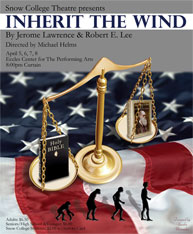Theatre Arts Department
 By Jerome Lawrence
By Jerome Lawrence
Directed by Michael Helms
April 5, 6, 7, 8
8:00 pm Curtain
Eccles Performing Arts Center
Adults: $6.50
Seniors/High School & Younger: $6.00
Snow College Students: $2.00 w/Activity Card
Season Ticket
Adults: $20.50
Seniors/High School & Younger: $19.00
In the blistering hot summer of 1925, two nationally-known legal minds, Clarence
Darrow and William Jennings Bryan, battled in a tiny courtroom in Dayton, Tennessee,
and, for a time, captured the attention of the world. The issue? A state law that
forbid the teaching of evolution and a local teacher's violation of that law. The
official name of this encounter was Tennessee vs. John Thomas Scopes, but it became
known the world over as the Scopes "Monkey Trial."
Thirty years later, in 1955, playwrights Jerome Lawrence and Robert E. Lee published
their dramatized version of the events of the summer of 1925. In a brief note at the
beginning of the play, the playwrights admit that the Scopes Monkey Trial was clearly
the inspiration for their work. But, the authors emphasize "Inherit the Wind is not
history" and that the "collision of Bryan and Darrow at Dayton was dramatic, but...
not drama."
Bringing history to life through drama involves a risk that the central issues will
be seen as "of the past" and of no relevance to the present. Inherit the Wind, however,
has thrived for over three decades, suggesting an attraction for theater-goers far
greater than that of a quaint look at America's past. As people search for meaning
in an increasingly complex world, the different belief systems that attempt to provide
some kind of nderstanding can, and do, come into conflict. Whether these systems wear
such labels as religion, science, or politics, the struggles that exist within and
between them is reflective of a cultural conflict that has yet to be, and may never
be, resolved. Inherit the Wind then, is far more than the story of twelve exciting
days in a Tennessee courtroom; it is a narrative of a nation and its people as they
struggle to come to grips with the forces of change.